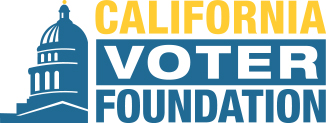Dear Friends,
 2019 is drawing to a close, and the 2020 election is rapidly approaching! The California Voter Foundation is already gearing up, helping voters prepare to vote with confidence. And we are helping to shape California's implementation of risk-limiting audits while working with local election officials to reduce vote-by-mail ballot rejection rates. See below for updates on our recent activities.
2019 is drawing to a close, and the 2020 election is rapidly approaching! The California Voter Foundation is already gearing up, helping voters prepare to vote with confidence. And we are helping to shape California's implementation of risk-limiting audits while working with local election officials to reduce vote-by-mail ballot rejection rates. See below for updates on our recent activities.
If you have not done so already, please consider making a tax-deductible donation to support our programs and help CVF keep working for the voters. To those who have already contributed, a big thank you for your support and an incredible 25 years of CVF!
Kim Alexander, President & Founder
California Voter Foundation
No Party Preference Vote-by-Mail Voters Urged to Contact Counties
Amid holiday festivities, California's county election staff are working hard preparing for the March 3, 2020 Presidential primary.
 Throughout December, county election offices have been sending out notices to an estimated 4.2 of the 5.4 million Californians registered as "No Party Preference" (NPP) who are also Vote-by-Mail voters, asking if they want to receive a "crossover" ballot that has presidential candidates on it from one of the three parties that allow NPP voters to participate in their presidential primary contest. The three parties are Democratic, American Independent and Libertarian.
Throughout December, county election offices have been sending out notices to an estimated 4.2 of the 5.4 million Californians registered as "No Party Preference" (NPP) who are also Vote-by-Mail voters, asking if they want to receive a "crossover" ballot that has presidential candidates on it from one of the three parties that allow NPP voters to participate in their presidential primary contest. The three parties are Democratic, American Independent and Libertarian.
In addition, California's Secretary of State Alex Padilla sent out an email last week to 1.7 million NPP vote-by-mail voters whose voter registration records include an email address alerting them to pay attention and respond to these notices, and has provided a helpful online tool, How To Vote for US President, to help California voters understand what they need to do to receive their preferred ballot for the March 3 presidential primary.
Presidential primaries are among the most confusing California elections. In all other primaries, a voter's party preference does not matter, you can vote for any candidate of any party regardless of the candidate's party preference or your own. But that changes in presidential contests, where the national political parties set the rules for participation. This year, as in past presidential primaries, the Democratic Party is allowing NPP voters to participate in its California presidential primary. The Republican Party, on the other hand, requires participants to be registered Republicans to participate in its California presidential primary.
For the estimated 4.2 million voters who have received county notices, what they need to do is respond by mailing a signed request for a specific crossover mail ballot, or call their county election office and make the request by phone.
Counties are working now to prepare vote-by-mail ballots which will be issued starting February 3. That's why it's important for NPP vote-by-mail ballots to get in touch with their county registrars and let them know now if they want a crossover ballot. Most counties are asking NPP vote-by-mail voters to state a preference by early January. Voters who miss this deadline will still have an opportunity to get a different ballot.
For the remaining 16 million voters who were not sent notices, now is a good time to verify your registration status and make sure you are registered with your preferred party so you will be issued a ballot, whether by mail or at a polling place or vote center, that includes the presidential candidate of your choice (check out the Certified List of Candidates to see who's running with each party).
In 2020, for the first time, thanks to the enactment of SB 72, conditional voter registration will be available at all voting locations on Election Day to ensure voters can update their party preference if needed to obtain the Primary ballot of their choice. While this is a welcome failsafe, voters are urged to not wait until the last minute and verify and update their registered party preference if needed now, before ballots are printed and issued.
CVF Weighs in on Proposed California Risk-Limiting Audits Regulations
On December 10, the California Voter Foundation, along with representatives of Verified Voting, UC Berkeley Statistics Professor Philip Stark, and Inyo County Clerk-Recorder and Registrar of Voters Kammi Foote submitted a joint letter commenting on risk-limiting audits regulations proposed by the California Secretary of State.
CVF's joint comment letter is posted on the CVF web site and the proposed regulations and supporting materials are available on the Secretary of State's web site. CVF's response focuses on four issues: the proposed regulations as drafted conflict with California statute; the risk-limiting audit software tool's software should be required to be publicly disclosed; cast vote records should be made sufficiently publicly available online to allow the public to verify that the audit is being conducted properly; and clarification is needed regarding how partial risk-limiting audits will be carried out.
More information about our joint response is featured on the blog for UC Irvine's Intellectual Property, Arts and Tech Clinic, whose director, CVF board member and UCI law professor Jack Lerner and law students assisted with drafting the joint response as well as with CVF's year-long participation in the California Secretary of State's Risk-Limiting Audits Workgroup.
For a quick lesson on the benefits of post-election audits and how risk-limiting audits work, check out these two-minute videos from the Center for Technology and Civic Life.

